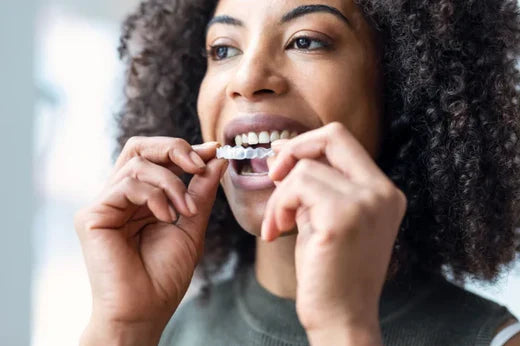
Table of Contents
- Types of jaw-popping
- Causes
- Misaligned teeth
- Arthritis
- Broken or dislocated jaw
- Habitual teeth grinding
- Myofascial pain syndrome
- Sleep apnea
- Infection
- Care and Treatment
- The Role of Clear Aligners in Addressing Misalignment
- Risks of Not Treating Jaw Clicking
- Can I Prevent Jaw Popping?
- Conclusion
- FAQs
If you feel a clicking or cracking sound while speaking, chewing, or yawning, your jaw is popping. This is a symptom of temporomandibular joint disorders, commonly known as TMJ. If you have a clicking sound, you might have these problems as well.
- Jaw pain
- Headache
- Ear ache
- Neck pain
Jaw cracking can be mild to severe and it can affect both sides of your face. There can be multiple reasons for this, but the good news is that many solutions for treating it are available. Depending on the severity of your case, you may have to go through some lifestyle changes, nonsurgical dental treatments, or orthodontic surgery.
Types of Jaw-Popping
There are two types of jaw-popping:
Normal Jaw-Popping: This happens when you open your mouth wide, it is not an issue to be worried about.
Problematic Jaw-Popping: This happens when your jaw pops while speaking, chewing, or yawning. It occurs when the articular disk slides in and out of place.
Causes
Your jaw might pop or click if you have:
Misaligned Teeth
When your teeth don’t line up properly, your jaw can start making weird popping sounds. This happens because the extra stress on your jaw joint throws things off balance. Sometimes, the soft cushion in your joint even shifts out of place, causing that clicking noise.
Arthritis
Arthritis, such as rheumatoid arthritis (RA) and osteoarthritis (OA), can damage the cartilage of the jaw joint. This damage makes jaw movements rough, causing popping or clicking sounds when you open or close your mouth. Osteoarthritis can also make other joints stiff and painful, making daily activities harder. Rheumatoid arthritis may cause fatigue, anemia, and even loss of appetite, affecting overall health. Since arthritis worsens over time, managing it usually requires long-term medical care and lifestyle adjustments.
Broken or Dislocated Jaw
A broken or dislocated jaw can make your jaw pop. If your jawbone cracks or shifts from its position, it can cause the temporomandibular joint disorder (TMJ). This leads to a popping or clicking sound while talking or chewing. It also creates swelling, bleeding, or numbness in your face. Quick medical treatment is necessary to avoid long-term damage.
Habitual Teeth Grinding
If your teeth grind too much, your jaw can pop. This habit is called bruxism, and it puts a lot of pressure on the joint of your jaw. These joints are commonly known as the temporomandibular joints (TMJ), and they help you open and close your mouth smoothly. Too much grinding can dislocate them, and you might hear a popping sound or even feel pain while moving your jaw. Over time, constant grinding can damage the joint’s cartilage, making the problem worse and harder to ignore.
Myofascial Pain Syndrome
Myofascial pain syndrome (MPS) causes chronic discomfort in the musculoskeletal system. The pain is usually limited to a single area. MPS can cause the jaw to pop. You can develop trigger points or sensitive spots with MPS, these points cause pain when pressure is applied. If you have MPS you might have:
- Pain in the muscles that worsens with tension or stretching, persists for more than a week,
- Painful knots in the jaw muscles
- Limited range of motion in the afflicted area
- As well as mood and sleep disorders
Sleep Apnea
Jaw popping can be caused by either obstructive sleep apnea (OSA) or central sleep apnea. OSA causes a person to stop breathing involuntarily during their sleep cycle due to throat narrowing. The reduced airflow limits how much air enters the lungs. This leads the individual to wake up and catch their breath. Some other symptoms of OSA are:
- Headaches
- Leg swelling
- Snoring
- Depression
- Daytime sleepiness
Infection
Salivary gland infection can lead to TMJ issues and jaw popping, this infection can include:
- The parotid glands - located in each cheek
- The submandibular glands - found below the jawbone
- The sublingual glands - situated beneath the tongue.
You might not be able to open your mouth and you may also have:
- Pus in the mouth
- Dry mouth
- Face pain
- Foul taste in the mouth
- Swelling of the face and neck
Salivary gland infections should be treated as early as possible.
Care and Treatment
Dentists treat a popping jaw in multiple ways, depending on the severity of your case.
Lifestyle changes
To improve minor jaw popping, eliminate or minimize detrimental practices like:
- Biting your nails.
- Chewing gum excessively.
- Crunching on ice.
- Eating a lot of tough or chewy meals.
Home remedies
If lifestyle modifications fail to reduce jaw popping and pain, your healthcare professional may suggest:
- Use ice packs to minimize swelling in your jaw joint.
- Using heat to relax your jaw.
- Wearing a mouth guard will protect your teeth from grinding and clenching. (You can get a custom mouth guard at ALIGNERCO created by expert dentists.)
- Eating soft foods.
- Nonsteroidal anti-inflammatory medicines (NSAIDs) are medications used to reduce inflammation.
Dental alignment
Misaligned teeth can lead to jaw popping, and teeth straightening can resolve the issue of your cracking jaw. There are multiple ways to straighten your teeth to attain a perfect smile, a proper functioning bite, and solve the problem of jaw popping. The most common of them are:
- Traditional braces: These are the traditional and proven way to straighten the teeth, these are metal wires fixed in your mouth to apply gentle pressure on your teeth to bring them to the right place. These are the most common ways to align your teeth correctly. But traditional braces have a few downsides like they are expensive, slow, and uncomfortable, and they come with many food restrictions.
- Clear aligners: Clear aligners are the modern solution to align your teeth, these are customized trays of plastic to wear in your mouth. They also apply the same kind of gentle pressure on your teeth as traditional braces to align them properly, but they have many benefits over traditional braces. They are affordable, quicker, and comfortable, and they have no food restrictions.
There are some other orthodontic treatments used to straighten your teeth, but they don't treat popping or cracking jaws.
- Veneers: Veneers are cosmetic dental treatments that make your teeth look straight.
- Dental bonding: It is also a cosmetic treatment, using a resin of matching color of your teeth, to make them look straight.
Night guards

Grinding or clenching your teeth, especially during sleep, can wear down the enamel, leading to tooth sensitivity, and jaw pain. Wearing a night guard acts as a protective barrier, absorbing the pressure and preventing damage to your teeth and jaw. This simple device can help maintain your dental health and reduce discomfort associated with these habits. You can buy a customized high-quality night guard from ALIGNERCO at just $135.
Nonsurgical treatments
You may be able to treat a popping jaw with medical but not surgical treatments, these may include:
- TMD-specific physical therapy: Physiotherapy of your jaw can be effective in treating jaw popping using different jaw exercises.
- Trigger point massage: A physiotherapist may find the trigger points in your jaws and massage them to loosen and relax them.
- Radio wave therapy: Radio waves can be used to increase the blood flow and stimulate your jaw joint.
Dental Surgery
If you have a severe case of popping jaw, you might need to undergo an orthodontic surgery. These are the most common forms of jaw surgeries:
- Arthrocentesis: An arthrocentesis removes excess fluid in your jaw joint and may also inject corticosteroids to relieve swelling, this is also called aspiration.
- Arthroscopy: A surgeon makes a small cut near your jaw and inserts a thin tube with a light and a camera to diagnose and treat TMJ issues without major incisions.
- Arthroplasty: This is a major jaw surgery covering repair, replacement, removal, or repositioning of your jaw.
The Role of Clear Aligners in Addressing Misalignment
If your jaw pops when you open or close your mouth, misaligned teeth could be the reason. When your teeth don’t line up properly, it can put extra strain on your jaw joint, leading to that annoying clicking or popping sound. Clear aligners help by slowly shifting your teeth into the right position, which can take the pressure off your jaw and, over time, may even stop the popping altogether. Plus, they double as a protective layer, reducing the damage caused by teeth grinding—a common culprit behind jaw pain.
Risks of Not Treating Jaw Clicking
Treat your popping jaw as soon as possible, ignoring it can lead to several health issues:
- Chronic Pain: Untreated jaw problems may cause persistent discomfort in the jaw, face, neck, and shoulders.
- Joint Damage: Without treatment, the temporomandibular joint (TMJ) can suffer damage, leading to inflammation and more severe complications.
- Dental Issues: Jaw disorders can result in teeth grinding or clenching, causing tooth wear, fractures, and sensitivity.
- Headaches and Ear Problems: Problems with the TMJ can trigger frequent headaches and ear-related issues, such as ringing or fullness.
Addressing jaw clicking early can help prevent these complications and maintain overall health.
Can I Prevent Jaw Popping?
There isn't much you can do to keep jaw cracking from occurring in the first place, especially if it's caused by bone anomalies. However, to lessen your chances of jaw clicking due to teeth grinding, try training yourself to keep your teeth slightly apart unless you're eating, swallowing, or speaking. Keeping your jaw relaxed and at rest can help you avoid problems like TMD.
Conclusion
Jaw popping, or the clicking sound you hear when moving your jaw, can be caused from various issues like misaligned teeth, arthritis, or habitual teeth grinding. Ignoring this symptom may lead to chronic pain, joint damage, dental problems, and headaches. Treatment options range from lifestyle changes and home remedies to dental alignments and, in severe cases, surgery. Clear aligners offer a modern solution to correct misaligned teeth, potentially reducing jaw popping and associated discomfort. Addressing jaw issues promptly is essential to prevent further complications and maintain overall well-being.
FAQs
Will the jaw popping stop?
People with popping mouths typically have a positive outlook. Jaw clicking is a common symptom of TMD and usually resolves with treatment.
Why is my jaw clicking on one side?
When your jaw clicks or snaps, it is frequently a sign of TMJ Disorder. TMJ disorders can arise on either side of the face.
Is jaw popping something to worry about?
Sometimes, jaw popping isn't serious and might go away on its own. But if it's happening often or comes with pain, trouble moving your jaw, or headaches, it's a good idea to talk to a doctor or dentist. They can help find out what's wrong and suggest ways to fix it.
Why is my jaw popping but not hurting?
If your jaw only pops, without any pain, or there is no limit to the movement of your jaw, this is typically not a cause for concern. Even though soreness is a typical TMD symptom, it is crucial to note that some individuals with jaw popping never experience pain. If you have popping jaws when eating or speaking, you should see a doctor, even if you are not in pain.
Resources
Ferneini EM. Temporomandibular Joint Disorders (TMD) (https://pubmed.ncbi.nlm.nih.gov/34620421/). J Oral Maxillofac Surg. 2021 Oct;79(10):2171-2172. Accessed 2/1/2023.
Gotter, A. (2023, April 24). Jaw popping. Healthline. https://www.healthline.com/health/jaw-popping#treatment
Kumar N, Daigavane P, Jain S, Mantri N. Review of Various Clinical Assessment Indices and Orthodontic Management for Temporomandibular Joint Disorders (https://pubmed.ncbi.nlm.nih.gov/36415405/). Cureus. 2022 Oct 19;14(10):e30492. Accessed 2/1/2023.
Li DTS, Leung YY. Temporomandibular Disorders: Current Concepts and Controversies in Diagnosis and Management (https://pubmed.ncbi.nlm.nih.gov/33800948/). Diagnostics (Basel). 2021 Mar 6;11(3):459. Accessed 2/1/2023.
National Organization of Rare Diseases. Osteomyelitis (https://rarediseases.org/rare-diseases/osteomyelitis/). Accessed 2/1/2023





